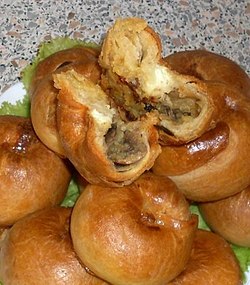Knish
 Knishes with mashed potato and fried onions | |
| Alternative names | Knysh |
|---|---|
| Type | Snack, side dish, finger food |
| Region or state | United States, Israel, other countries with a significant Ashkenazi Jewish population |
| Created by | Jewish communities in Central and Eastern Europe |
| Main ingredients | Mashed potatoes, dough, ground meat, sauerkraut, onions, kasha, cheese |
A knish /kəˈnɪʃ/ or /knɪʃ/ is a traditional Ashkenazi Jewish[1] snack food consisting of a filling covered with dough that is typically baked or sometimes deep fried.
Knishes are often purchased from street vendors in urban areas with a large Jewish population, sometimes at a hot dog stand, or from a butcher shop. They are still strongly associated with New York City cuisine. [2]
In most traditional versions, the filling is made entirely of mashed potato, kasha (buckwheat groats), or cheese. Other varieties of fillings include beef, chicken, sweet potatoes, black beans, or spinach.[3]
Knishes may be round, rectangular, or square. They may be entirely covered in dough or some of the filling may peek out of the top. Sizes range from those that can be eaten in a single bite hors d'oeuvre to sandwich-sized.
History in the United States

Ashkenazi Jewish immigrants who arrived sometime around 1900 brought knishes to the United States.[4] Knish (קניש) is a Yiddish word of Slavic origin, related to the Ukrainian knysh (книш) and Polish knysz. The ancestor of the knish was a medieval fried vegetable patty or fritter called knysz; eventually it became a stuffed item. In Ukraine, the knysz evolved into a filled yeasted bun, and today is usually sweet rather than savoury; the Russian cousin to the Jewish knish is the pirozhok (пирожки́). The traditional food spread to neighbour countries, migration from which helped spread the food further. Knishes began to be baked (rather than fried) around the same time that the potato was popularized in Eastern Europe, and the dough wrapper gradually became more like pastry than bread.[5]
The first knish bakery in America was founded in New York City in 1910.[6] Generally recognized as a food made popular in New York City by Jewish immigrants in the early 20th century, the United States underwent a knish renaissance in the 2000s driven by knish specialty establishments such as Knishes and Dishes in Philadelphia, the Knish Shop in Baltimore, Maryland,[7] Buffalo and Bergen[8] in Washington, DC, or My Mother's Knish,[9] in Westlake Village, California.
In the 20th century, New York City and state politicians portrayed themselves eating knishes to show solidarity with Jewish working-class people. The trend declined after suburbanization and the policies of Ed Koch and Rudy Giuliani that restricted the sale of knishes from food carts.[10]
See also
- Bourekas – Filled pastry in Sephardic Jewish cuisine
- Croquette – Small breaded, deep-fried food
- Jewish cuisine – Culinary traditions of Jewish communities around the world
- Israeli cuisine – Culinary traditions of Israel
- Turnover – Sealed pastry with filling
- Yonah Shimmel's Knish Bakery – Bakery and restaurant located in Manhattan
- Baozi – a Chinese steamed bun that can be made with a variety of fillings such as meat
References
- ^ Wasserman, Tina D. (Winter 2009). "Cooking: The Ultimate Jewish Finger Food". Reform Judaism Magazine. Archived from the original on December 22, 2010. Retrieved 2010-09-14.
- ^ Silver, Laura (May 6, 2014). Knish: In Search of the Jewish Soul Food. Waltham, Mass.: Brandeis University Press. ISBN 978-1-61168-312-7.
- ^ Durand, Faith (2019-05-24). "The Newbie's Guide to the Knish". Kitchn. Retrieved 2022-12-09.
- ^ Smith, Andrew F. (May 2007). The Oxford Companion to American Food and Drink – Google Boeken. Oxford University Press, USA. ISBN 9780195307962. Retrieved 2013-01-21.
- ^ Marks, Gil (2010). The Encyclopedia of Jewish Food. New York: Houghton Mifflin Harcourt. pp. 322–323.
- ^ Yellin, Nina (2001). Kugel, Knishes, and Other Tasty Dishes. Flower Mound, TX: Smylan Reed Books. ISBN 9780962281129.
- ^ "The Knish Shop, Baltimore". Jewishinbaltimore.com. Archived from the original on 2022-05-24. Retrieved 2013-01-21.
- ^ Spiegel, Anna (2012-05-24). "Gina Chersevani's Union Market Soda Shop and Bar Will Be Called Buffalo and Bergen". Washingtonian. Retrieved 2013-01-21.
- ^ Richman, Alan (8 February 2006). "A Mother's Knishes". GQ. Retrieved 2013-01-21.
- ^ Silverstein, Andrew (2021-04-07). "Once the staple of New York politics, whatever became of the knish?". Forward. Retrieved 2021-04-15.

